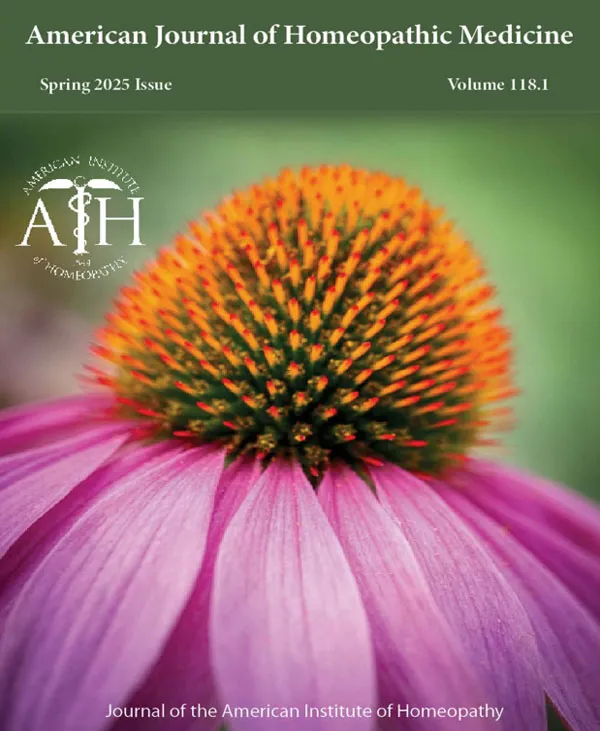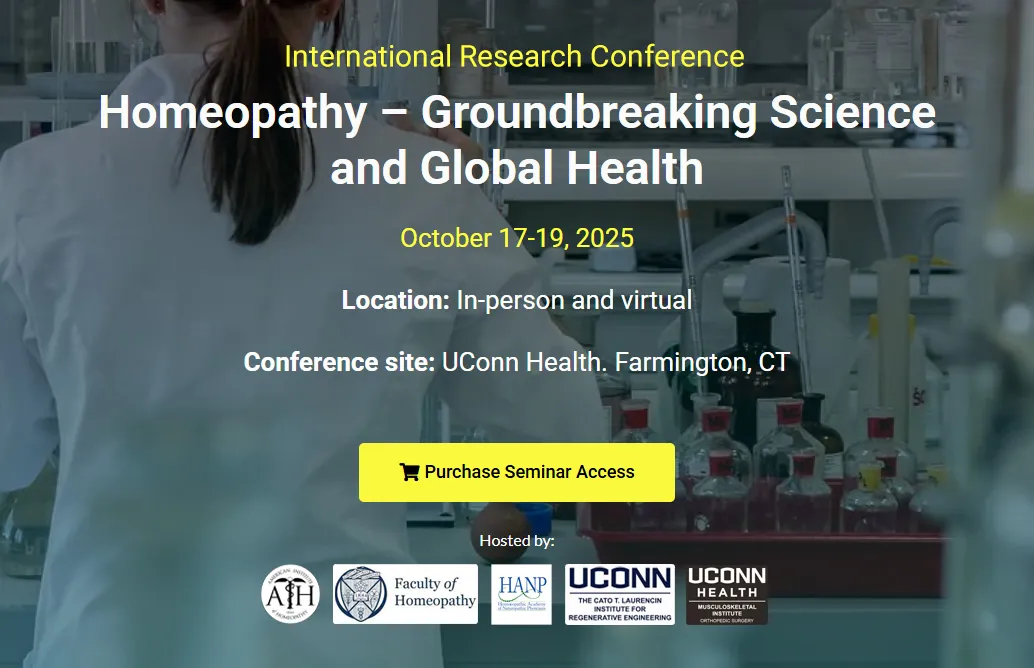
AIH Accuses European Academies Science Advisory Council of Deliberate Scientific Bias
Press Release
For Immediate Release
American Institute of Homeopathy Accuses European Academies Science Advisory Council of Deliberate Scientific Bias
Washington DC.: The American Institute of Homeopathy (AIH), America’s oldest extant national medical organization, today called on the European Academies Science Advisory Council (EASAC) to either retract or substantially amend their most recent pronouncements on homeopathy, statements filled with bias and inexcusably poor scientific analysis.
What’s more, according to the AIH, the European Academies appear to have succumbed to a conflict of interest and issued their statement at the urging of at least one consultant to the pharmaceutical industry1 and with predetermined findings in mind.
According to Dr. Ronald Whitmont, MD, President of AIH, bias is apparent even in the initial call for a report on homeopathy. One only need look at the earliest documents circulated by this group to see that their undertaking was not an examination of evidence but rather an attempted defamation. Their documents state ‘we would need to be clear at the outset how to focus key messages (i.e. that homeopathic products are ineffective apart from the placebo effect and that there is no validated evidence base to support their use).’
Evidence Completely Ignored
In claiming that there is no scientific evidence for homeopathy beyond placebo, the EASAC inexplicably ignores the large body of research including 43 published systematic reviews of homeopathy. Instead, the EASAC chooses to discuss only one single meta-analysis (Shang2 ), ignoring the fact that this study had already been dismissed due to a failure to meet elementary standards of quality and transparency3.
The EASAC cites two other publications by authoritative bodies which were also deeply flawed. These include the 2010 UK House of Commons Science and Technology Committee report ‘Evidence Check 2: Homeopathy’, and the 2015 Australian National Health and Medical Research Council (NHMRC) report on homeopathy both critical of homeopathy. The EASAC fails to mention that the report of the House of Commons Science and Technology Committee was only voted on by 4 out of 14 committee members and later condemned by Parliament. They also fail to mention or perhaps did not realize that the Australian National Health and Medical Research Council (NHMRC) report on homeopathy is also deeply flawed as well as biased. That report set unprecedented criteria for trial ‘reliability’ that appear to have been introduced by the committee solely for homeopathy. No other study conducted by the NHMRC has ever set such a high bar. There is also evidence of malpractice: the NHMRC concealed the fact that it reviewed the evidence twice. The committee has refused numerous Freedom of Information Act requests to release the findings of the first review. Also without precedent, the committee did not include a single homeopathic expert on their panel perhaps understandable given the committee Chair was a member of Friends of Science in Medicine a group long antagonistic towards homeopathy and well supported by the pharmaceutical industry.
If the EASAC had taken an honest look at the entire body of published data on homeopathy, without bias, then they would have found well documented comparative clinical effectiveness trials confirming the real-world benefits of homeopathy in a wide range of conditions4,5,6,7,8,9,10,11. Although the precise mechanism of action behind homeopathic medicines is only beginning to be understood, there is ample reliable evidence indicating that it works. The false argument of plausibility provided by this and other organizations has no place in any scientific investigation. If it did, scientific progress would have stopped shortly after the stone age. Individuals who use this argument have resorted to prejudice and bias in place of objective scientific inquiry, and should be exposed as mercenaries of industry. It falls to scientists with courage and a deep sense of curiosity to fathom the depths of these important medical questions and to drop the rhetoric that barely disguises their true motive: to defame and discredit a competing modality of medical science.
We understand the great financial pressures facing the large pharmaceutical companies that have set out to discredit and destroy homeopathy, but we are deeply saddened to see more evidence of their manipulation within well respected scientific institutions. The public deserves better than this. said Whitmont.
References:
- https://newsvoice.se/2015/01/08/dan-larhammar-arbetar-for-lakemedelsindustrin-och-kritiserar-samtidigt-alternativmedicin/
- Shang A, Huwiler-Müntener K, Nartey L, et al. Are the clinical effects of homoeopathy placebo effects? Comparative study of placebo-controlled trials of homoeopathy and allopathy. Lancet. 2005 Aug 27-Sep 2;366(9487):726-32.
- Lüdtke R, Rutten L, The conclusions on the effectiveness of homeopathy highly depend on the set of analyzed trials. J Clin Epidemiol. 2008;61:1197-204.
- Riley D, Fischer M, Singh B, et al. (2001). Homeopathy and Conventional Medicine: An Outcomes Study Comparing Effectiveness in a Primary Care Setting. Journal of Alternative and Complementary Medicine, 7:149 159.
- Haidvogl M Riley D, Heger M et al. Homeopathic and conventional treatment for acute respiratory and ear complaints: A comparative study on outcome in the primary care setting BMC Complement Altern Med. 2007; 7: 7. doi:
- Trichard M, Chaufferin G Nicoloyannis N (2005). Pharmacoeconomic comparison between homeopathic and antibiotic treatment strategies in recurrent acute rhinopharyngitis in children. Homeopathy, 94:3 9.
- Trichard M, Chaufferin G (2004). Effectiveness, quality of life, and cost of caring for children in France with recurrent acute rhinopharyngitis managed by homeopathic or non-homeopathic General Practitioners. Disease Management and Health Outcomes, 12:419 427.
- Witt C, Keil T, Selim D, et al. (2005). Outcome and costs of homeopathic and conventional treatment strategies: a comparative cohort study in patients with chronic disorders. Complementary Therapies in Medicine, 13:79-86.
- Witt CM, Lüdtke R, Baur R, Willich SN (2005). Homeopathic medical practice: long-term results of a cohort study with 3,981 patients. BMC Public Health, 5:115.
- Rossignol M, Begaud B, Engel P, et al. Impact of physician preferences for homeopathic or conventional medicines on patients with musculoskeletal disorders: results from the EPI3-MSD cohort. Pharmacopepidemiol. Drug Saf. 2012, 21:1093-101.
- Grimaldi-Bensouda L, Begaud B, Rossignol M, Avouac B, Lert F, et al. (2014) Management of Upper Respiratory Tract Infections by Different Medical Practices, Including Homeopathy, and Consumption of Antibiotics in Primary Care: The EPI3 Cohort Study in France 2007 2008. PLoS ONE 9(3): e89990. doi:10.1371/journal.pone.0089990
Latest News & Updates
Latest Issue of the AJHM
AJHM – Spring 2025
Volume 118 Number 1
Table of Contents
- Editorial: In this issue
- President’s Message: Our Guiding Precepts
- Homeopathic PuZZle?
- Alchemy, Spagyrics, and Homeopathy: Tracing the Threads of Energetic Medicine
- The Genius of Fluoricum acidum: Part One
- An Interesting Case of Kola
- Book Review: ‘Lessons in Pure Homeopathy, From the Writings of Hahnemann’s Best Student and Medicine’s Most Successful Practitioner, Adolph Lippe, MD’ – Edited & Annotated by A. Saine, ND
- Book Review: ‘Folkways and Homoeopathy: Our Ancestral Secret of Healing’ by Shailendra Ramchandra Vaishampayan





